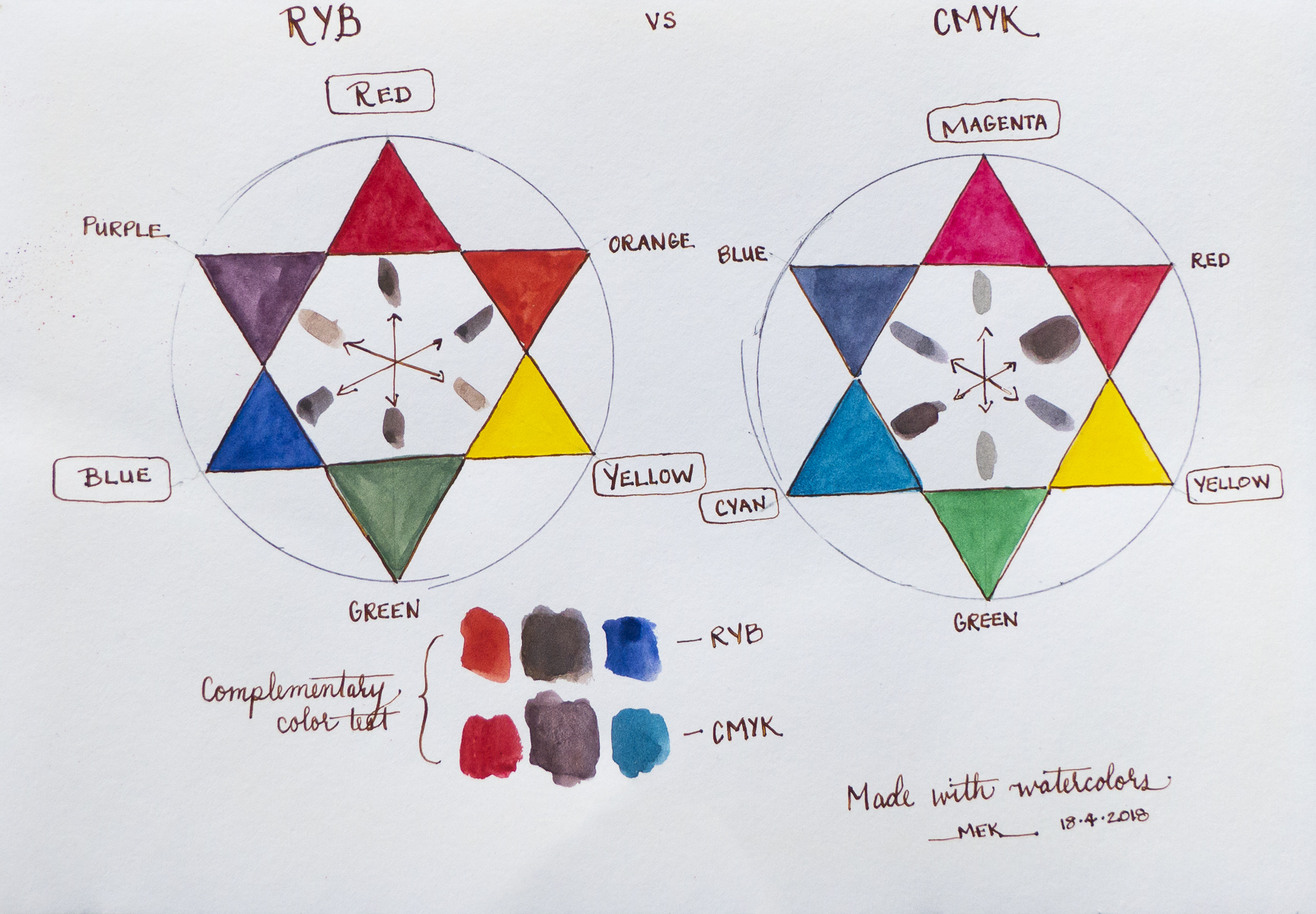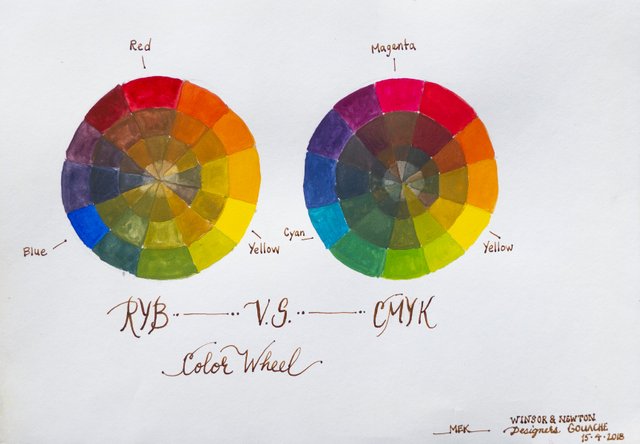RYB vs CYMK color model for traditional art
RYB vs CMYK for art
What are RYB and CMYK and what is the difference between them? Given limited color choices, which method will give you the highest chroma colors? Why is RYB possibly an outdated concept?
These kind of questions are what I will attempt to answer in this article - traditional style! As always, I'm still learning myself so if you spot any errors or want to add something, please feel free to drop a feedback. Now, let's get started!

Bigger image
(fig. 1) - Homemade chart by @dm7 in watercolors
RYB Color Model
Known as red, yellow, and blue (see fig. 1 on the left side), this old subtractive color model is designed for mixing painting pigments with primary colors.

(fig. 2) - Franciscus Aguilonius color schemefrom Wikipedia
The first model can be found in 1613 by Franciscus Aguilonius; however, it wasn't arranged in a wheel (see fig. 2). RYB primary colors became a standard theory of color vision in 18th century supported by psychological color effects, such as "complementary" or opposing hues that our eyes see as afterimages. Its secondary colors consist orange, green, and purple. At this time, the difference between subtractive and additive color model didn't exist.
CMYK Color Model
It stands for cyan, magenta, yellow, and key (black) colors (see fig. 1 on the right side).

(fig. 3) - CMYK color modelfrom Wikipedia
This modern, subtractive process color, four color model has been scientifically established to give the most color output for the printer while saving the cost and space. Secondary colors are made of red, green, and blue. It is an improved theory that shows the difference between subtractive (CMYK) and additive (RGB) model.
Which gives highest chroma colors?
As an artist with a limited budget or one who just want to start out with a limited color palette, no doubt you want to know the straight answer to this question. Well, you're in luck here because I did a lot of experiments on that. Let's check out my RYB and CYMK comparison done in gouaches (see fig. 4).

Bigger image
(fig. 4) - Homemade chart by @dm7 in gouaches
In RYB color model, you can see that from red to yellow, the color mix gave a vibrant result, but it becomes dull and somewhat muddy as you go on toward blue and back to red. It is because this ultramarine blue has a bit of red in it which dulls down the green. Same for red, it has a bit of yellow in it; thus, it dials down all purples.
As you may have noticed in CMYK model, all colors obtained from mix seems to be more or less equally vibrant and cleaner. It is not perfect though. Notice the blue I mixed from cyan and magenta is less vibrant than ultramarine blue in RYB wheel. Same for red, it's slightly less vibrant... just barely.
I also have tested it in watercolors (fig. 1), oil paint and digital medium (sorry, no example at the moment, but I could create one by request) and this concept still holds true.
So therefore, with this account and my experiences carefully weighted in,
CMYK wins this round!
Yay!
Stay tuned for upcoming articles where we will dig even deeper!
Here are possible articles - it's up to you to tell me what you want to read about. :)
- What are complementary colors? Which model is better for complementary colors?
- Limited palette, Zorn palette as an example
- Split primary color palette
- Transparency and opacity
- Oil paint pigments, is it worth having an expensive pigment? Cobalt blue for example and compare it to other blue pigments. Also if possible, find the closest pigment as a cheap alternative. Cadmium, is it good to have? Etc.
- Art fundamentals
- Art supply reviews
- My art and my progress
Well, you get the idea.
Also dear steemians, please let me know what you think of this article. Do you agree with me on this? Also, if you have any questions, please don't feel hesitate to ask! :) If there's anything I can improve on this or help out, please let me know since I'm just a new steemian here.
Cheers!
@Dm7
Great post. Once thing I've learned in life is "Build your own dreams, or someone else will hire you to build theirs."
Thanks. :)
I might add that RGB is standard for digital printing, CYMK is for offset printing.
Thank you very much for your feedback. According to my knowledge, digital printing also uses CYMK. RGB, in this case, is secondary colors and is an additive model which is used for the lights. Monitors, cameras, lights, and our eyes are all based on RGB model.
Besides, in this article, they used RGB plates to colorize the pictures in 1861 which worked decently but was super expensive so it got eventually replaced with CYM plates. That is if I understood it correctly.
If not, please feel free to correct me.
And lastly, in my article I wrote, my main purpose was to show that CYMK is a modern wheel to achieve the widest gamut in the most cost-effective way. :)
From my non-art-educated guy's point of view, that's really interesting.
Nice technical and experimental approach :)
Upvoted and resteemed :)
Thank you so much @barien! I'm glad you found it interesting - I wasn't sure about it. 😂 It was my first attempt at the technical piece.
Congratulations! This post has been upvoted from the communal account, @minnowsupport, by Dm7 from the Minnow Support Project. It's a witness project run by aggroed, ausbitbank, teamsteem, theprophet0, someguy123, neoxian, followbtcnews, and netuoso. The goal is to help Steemit grow by supporting Minnows. Please find us at the Peace, Abundance, and Liberty Network (PALnet) Discord Channel. It's a completely public and open space to all members of the Steemit community who voluntarily choose to be there.
If you would like to delegate to the Minnow Support Project you can do so by clicking on the following links: 50SP, 100SP, 250SP, 500SP, 1000SP, 5000SP.
Be sure to leave at least 50SP undelegated on your account.
Definitely, I have to read some theory if I want to improve, but I'm too lazy, hahaha. I like to see the work of others, I don't want them to tell me how they did it, I prefer to discover it myself observing and practicing. That's how I learned everything I know.
Btw, great article! I'll be waiting for your next posts :D
Haha, I know that feeling. I felt the same way until I started oil painting and quickly realized how important it is. I try to do it differently though, rather than just learning, I just do the experiments myself, see if it comes to the same conclusion and then work from there. It makes my color adventure much more colorful (pun intended). 😄 At the same time, I hope I can make it more understandable and straightforward for artists out there since a lot of color theory articles I've read are more geared toward science and education. Do I even make sense? shrug
Thank you, I'm glad you think it is great. :) Speaking of next posts, if you have any requests on that, I'm all open to it. :)
Cheers!
Dm7
great tutorial on interesting subject. I'm really learning more about it every day. What pigments are your cyan, magenta and yellow? I'd love if yo make some pigments by cost comparison later on. Cheers!
And go check: https://discord.gg/DcdMjDz
Thanks @jnart! Yup, me too. I'm still learning everyday!
I just discovered this cool community last night. ;) Thank you for the link though.. (to any curious artists who may read this - it's a great art community filled with steemians. ;))
Uhm, for oil, I use pv19 - permament rose, cadmium lemon, and phthalo blue (green-shade). Although for oil, they sell more magenta version you may want to try, but I just prefer rose. It's the beauty of CMYK wheel, it's somewhat flexible. In gouaches, I use Primary red, primary yellow, and primary blue (weird names for CMY). I'm afraid I can't answer on watercolors. It's a gift from my now deceased grandma, she was an artist - its booklet with pigment info is all blackened from the use. My best guess is phthalo blue (it behaves similarly?) and cadmium lemon - but I have no idea about that red I've used. It is on the cool side of red though.
Okay, I'll start with blues since I actually collected them the most. I was pretty obsessed to find that perfect blue and became interested in every pigment's unique characteristics. 😆 It might be a while before I can complete it though. I had to put oil paints away for a time being. Please bear with me. <3
Cheers!
Dm7
Take your time and be sure to inform me when it is done! And thanks for your cmyk choices! I might do a similar one about watercolor colour wheel in the future. ...and great that you found the forum. I haven't so much time to be active there but there are lots of great artists. Cheers!
Aye, I will @jnart :) Yeah, the point is to experiment and get a feeling of how it works, depending on your personal taste. I was just showing the best way to achieve the highest chroma with limited colors - it doesn't mean it'll work for everyone. Some artists work with Zorn palette which is even more limited than RYB wheel. So who knows. :)
Cheers! :)
Your Post Has Been Featured on @Resteemable!
Feature any Steemit post using resteemit.com!
How It Works:
1. Take Any Steemit URL
2. Erase
https://3. Type
reGet Featured Instantly & Featured Posts are voted every 2.4hrs
Join the Curation Team Here | Vote Resteemable for Witness